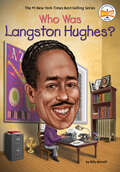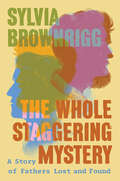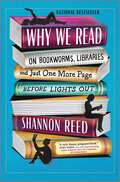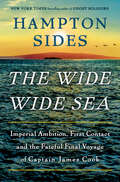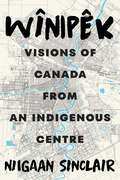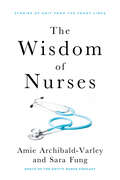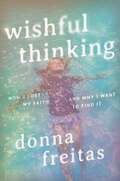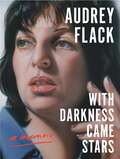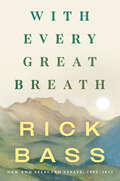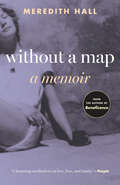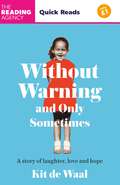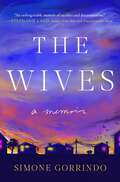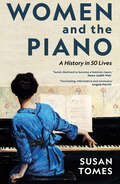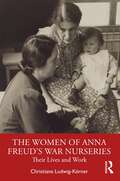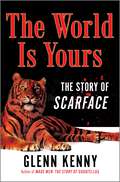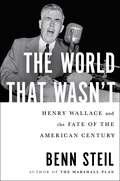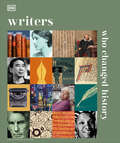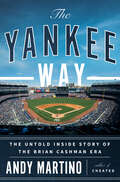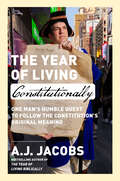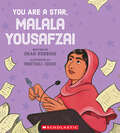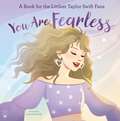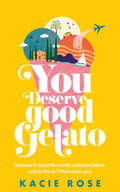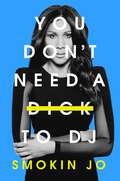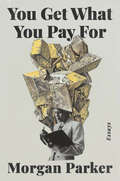- Table View
- List View
Who Was Langston Hughes? (Who Was?)
by Billy Merrell Who HQFind out how a young boy from the Midwest became one of the most important writers and activists of the Harlem Renaissance in this addition to the #1 New York Times bestselling series!Langston Hughes was born in Joplin, Missouri, and was raised by his grandmother, who told him many stories of the Black American experience and taught him to be proud of his race from a young age. With her guidance, Langston went on to become a talented writer in high school, creating dramatic plays, poetry, and articles for the school paper. His career as a writer would continue to blossom. Langston pioneered Jazz Poetry and published nearly twenty poetry books during his lifetime as well as novels, books for children, nonfiction books, and plays. He was an activist and a major figure of the Harlem Renaissance period, alongside Zora Neale Hurston and Countee Cullen. Young readers can learn about Langston's beloved writing, including some of his most famous poems "Dreams" and "The Weary Blues," and his long-lasting legacy in this middle-grade biography.
The Whole Staggering Mystery: A Story of Fathers Lost and Found
by Sylvia BrownriggSylvia Brownrigg's &“wise, intimate, and deliciously entertaining memoir" (Carol Edgarian) reconstructs a poignant story of fathers lost and foundWhen Sylvia Brownrigg received a package addressed to her father that had been lost for over fifty years, she wanted to deliver it to him before it was too late. She did not expect that her father, Nick, would choose not to open it. A few years later, she and her brother finally did.Nick, an absent father, was a would-be writer and back-to-the-lander who lived off the grid in Northern California. Nick&’s own father, Gawen—also absent—had been a wellborn Englishman who wrote a Bloomsbury-like novel about lesbian lovers, before moving to Kenya and ultimately dying a mysterious death at age twenty-seven. Brownrigg was told Gawen had likely died by suicide.Reconstructing Gawen&’s short, colorful life from revelations in the package takes her through glamorous 1930s London and staid Pasadena, toward the last gasp of the British Empire in Kenya, and from there, deep into the California redwoods, where Nick later carved out a rugged path in the wilderness, keeping his English past at bay. Vividly weaving together the lives of her father and grandfather, through memory and imagination, Brownrigg explores issues of sexuality and silences, and childhoods fractured by divorce. In her uncovering of this lost family, she writes movingly of daughterhood and of parenthood, gradually making her own story whole.
Why We Read: On Bookworms, Libraries, and Just One More Page Before Lights Out
by Shannon Reed*NATIONAL BESTSELLER**A Good Housekeeping Reads pick*A hilarious and incisive exploration of the joys of reading from a "beloved and wonderful writer" (George Saunders), teacher, bibliophile, and Thurber Prize SemifinalistWe read to escape, to learn, to find love, to feel seen. We read to encounter new worlds, to discover new recipes, to find connection across difference, or simply to pass a rainy afternoon. No matter the reason, books have the power to keep us safe, to challenge us, and perhaps most importantly, to make us more fully human.Shannon Reed, a longtime teacher, lifelong reader, and New Yorker contributor, gets it. With one simple goal in mind, she makes the case that we should read for pleasure above all else. In this whip-smart, laugh-out-loud-funny collection, Reed shares surprising stories from her life as a reader and the poignant ways in which books have impacted her students. From the varied novels she cherishes (Gone Girl, Their Eyes Were Watching God) to the ones she didn&’t (Tess of the d&’Urbervilles), Reed takes us on a rollicking tour through the comforting world of literature, celebrating the books we love, the readers who love them, and the ways in which literature can transform us for the better.
The Wide Wide Sea: Imperial Ambition, First Contact and the Fateful Final Voyage of Captain James Cook
by Hampton SidesOn July 12th, 1776, Captain James Cook, already lionized as the greatest explorer in British history, set off on his third voyage in his ship the HMS Resolution. Two-and-a-half years later, on a beach on the island of Hawaii, Cook was killed in a conflict with native Hawaiians. How did Cook, who was unique among captains for his respect for Indigenous peoples and cultures, come to that fatal moment? <P><P> Hampton Sides’ bravura account of Cook’s last journey both wrestles with Cook’s legacy and provides a thrilling narrative of the titanic efforts and continual danger that characterized exploration in the 1700s. Cook was renowned for his peerless seamanship, his humane leadership, and his dedication to science-–the famed naturalist Joseph Banks accompanied him on his first voyage, and Cook has been called one of the most important figures of the Age of Enlightenment. He was also deeply interested in the native people he encountered. In fact, his stated mission was to return a Tahitian man, Mai, who had become the toast of London, to his home islands. On previous expeditions, Cook mapped huge swaths of the Pacific, including the east coast of Australia, and initiated first European contact with numerous peoples. He treated his crew well, and endeavored to learn about the societies he encountered with curiosity and without judgment. <P><P> Yet something was different on this last voyage. Cook became mercurial, resorting to the lash to enforce discipline, and led his two vessels into danger time and again. Uncharacteristically, he ordered violent retaliation for perceived theft on the part of native peoples. This may have had something to do with his secret orders, which were to chart and claim lands before Britain’s imperial rivals could, and to discover the fabled Northwest Passage. Whatever Cook’s intentions, his scientific efforts were the sharp edge of the colonial sword, and the ultimate effects of first contact were catastrophic for Indigenous people around the world. The tensions between Cook’s overt and covert missions came to a head on the shores of Hawaii. His first landing there was harmonious, but when Cook returned after mapping the coast of the Pacific Northwest and Alaska, his exploitative treatment of the Hawaiians led to the fatal encounter. <P><P> At once a ferociously-paced story of adventure on the high seas and a searching examination of the complexities and consequences of the Age of Exploration, THE WIDE WIDE SEA is a major work from one of our finest narrative nonfiction writers. <p> <b>New York Times Bestseller</b>
Wînipêk: Visions of Canada from an Indigenous Centre
by Niigaan SinclairFrom ground zero of this country's most important project: reconciliationNiigaan Sinclair has been called provocative, revolutionary, and one of this country's most influential thinkers on the issues impacting Indigenous cultures, communities, and reconciliation in Canada. In his debut collection of stories, observations, and thoughts about Winnipeg, the place he calls "ground zero" of Canada's future, read about the complex history and contributions of this place alongside the radical solutions to injustice and violence found here, presenting solutions for a country that has forgotten principles of treaty and inclusivity. It is here, in the place where Canada began—where the land, water, people, and animals meet— that a path "from the centre" is happening for all to see.At a crucial and fragile moment in Canada's long history with Indigenous peoples, one of our most essential writers begins at the centre, capturing a web spanning centuries of community, art, and resistance. Based on years' worth of columns, Niigaan Sinclair delivers a defining essay collection on the resilience of Indigenous peoples. Here, we meet the creators, leaders, and everyday people preserving the beauty of their heritage one day at a time. But we also meet the ugliest side of colonialism, the Indian Act, and the communities who suffer most from its atrocities. Sinclair uses the story of Winnipeg to illuminate the reality of Indigenous life all over what is called Canada. This is a book that demands change and celebrates those fighting for it, that reminds us of what must be reconciled and holds accountable those who must do the work. It's a book that reminds us of the power that comes from loving a place, even as that place is violently taken away from you, and the magic of fighting your way back to it.
The Wisdom of Nurses: Stories of Grit From the Front Lines
by Amie Archibald-Varley Sara FungFrom the hosts of the hit podcast The Gritty Nurse, stories of the challenges, heartbreak and humour of life on the front lineOne of the enduring lessons of the pandemic has been the pivotal role that nursing plays in health care—vital work that isn’t widely understood or, sadly, appreciated. Sara Fung and Amie Archibald-Varley started the wildly popular The Gritty Nurse podcast to give voice to nurses all over the world, including more than 400,000 nurses in Canada. The authors have quickly become sought-after speakers and advocates for nurses and are called on regularly by the media to talk about a wide range of issues around the profession. In their first book, they take you to the front line of nursing to show the compassion, selflessness and dedication of professionals who not only give it all for their patients, but get up and do it over and over again.
Wishful Thinking: How I Lost My Faith and Why I Want to Find It
by Donna FreitasDonna Freitas wants to believe. Raised Catholic, she sang songs about Jesus as a child and lived in a house where nuns and priests were regular guests, yet she found herself questioning the faith of her family, examining the reasons none of it added up, and distancing herself from the God of Christianity. Despite her questions—or perhaps because of them—she made a career out of trying to understand God, pursuing a PhD in religion. But even as she taught college students about mystics, theologians, and others who wrestled with God, she was never able to embrace a faith of her own. In this searingly honest and deeply personal book, Freitas retraces her roundabout path up and out of the wilderness toward hope, and her dogged—and ongoing—search for faith. She talks about her experience with the Catholic abuse scandal, about being embraced as a speaker at evangelical colleges, about how the death of her mother and the loss of her marriage made her question everything she thought she knew about love, how she cannot reconcile the ways the concept of God makes absolutely no sense, and how she cannot stop trying to believe, despite it all. Real, raw, and beautifully written, Wishful Thinking is a powerful story about the author&’s search for belief in God and about finding God in the most unexpected places.
With Darkness Came Stars: A Memoir
by Audrey FlackOnly in the darkest moments of our lives do the brightest stars appear.An artist, mother, teacher, and rebel, Audrey Flack is counted among the most important American artists of the twentieth century. In With Darkness Came Stars, she recounts and reflects upon a life fully lived. Flack came up in the New York art scene when the city was fast becoming a world arts center. She had a studio in the Bowery and frequented the Cedar Tavern, where she rubbed elbows with Jackson Pollock, Willem and Elaine de Kooning, Grace Hartigan, and other giants of the Abstract Expressionist movement. After leaving that scene and starting a family, she spearheaded Photorealist painting, alongside the likes of Chuck Close and Richard Estes. Flack has lived a remarkable life, successfully navigating a vibrant and virulently sexist art world, escaping an abusive marriage, and reshaping the rules of art creation in the middle of the twentieth century—all while raising two children, one with severe autism. Her story is full of strife and striving, but as an artist, Flack has always been able to find the beauty in it.
With Every Great Breath: New and Selected Essays, 1995-2023
by Rick Bass"Master craftsman" (Los Angeles Times) and beloved author Rick Bass explores ecological, social, and personal landscapes through this collection that brings together his best-loved essays and brand-new piecesFor acclaimed writer and environmental activist Rick Bass, it can be wearying to dwell relentlessly upon the broken, the fragmented, the dead and dying and doomed to extinction. Activism is a necessary part of the environmental movement, but so is the time-honored celebration of the beauty that inspires us.Spanning his storied career, these new and selected essays attempt to take a brief step to the side, away from lamentation and prescription, to inhabit, as deeply as possible, the greater depths of the beauty in each moment. With Every Great Breath ranges from the extremely local—a long-form essay about the community affected by the largest Superfund site in U.S. history, in Libby, Montana—to the far-flung: the Galápagos, Namibia, and Alaska. Throughout, Bass offers a portrait of our planet that is always alert to its wonders, even in the face of environmental crisis.
Without a Map: A Memoir
by Meredith HallMeredith Hall's moving but unsentimental memoir begins in 1965, when she becomes pregnant at sixteen. Shunned by her insular New Hampshire community, she is then kicked out of the house by her mother. Her father and stepmother reluctantly take her in, hiding her before they finally banish her altogether. After giving her baby up for adoption, Hall wanders recklessly through the Middle East, where she survives by selling her possessions and finally her blood. She returns to New England and stitches together a life that encircles her silenced and invisible grief. When he is twenty-one, her lost son finds her. Hall learns that he grew up in gritty poverty with an abusive father—in her own father's hometown. Their reunion is tender, turbulent, and ultimately redemptive. Hall's parents never ask for her forgiveness, yet as they age, she offers them her love. What sets Without a Map apart is the way in which loss and betrayal evolve into compassion, and compassion into wisdom.
Without Warning and Only Sometimes: Quick Reads 2024
by Kit de WaalKit de Waal and her brother and sisters had a hard childhood in the West Midlands. Her Irish mother didn't feed them, didn't believe in Christmas or birthdays, and thought the world would end in 1975. Her father saved all his money to return to the Caribbean, where he planned to make a new life without them. At school, their faces just didn't fit in. This is the story of how Kit and her brother and sisters helped each other escape, and what gave Kit the strength to keep living.
Without Warning and Only Sometimes: Quick Reads 2024
by Kit de WaalKit de Waal and her brother and sisters had a hard childhood in the West Midlands. Her Irish mother didn't feed them, didn't believe in Christmas or birthdays, and thought the world would end in 1975. Her father saved all his money to return to the Caribbean, where he planned to make a new life without them. At school, their faces just didn't fit in. This is the story of how Kit and her brother and sisters helped each other escape, and what gave Kit the strength to keep living.
The Wives: A Memoir
by Simone Gorrindo&“[Simone] Gorrindo&’s prose is inviting and fluid, and her storytelling is intimate and vivid...[an] engaging, evocative memoir.&” —The New York Times Book Review &“A hopeful, unifying memoir.&” —People &“A haunting, beautifully written celebration of found sisterhood.&” —Publishers Weekly (starred review) &“A fearless, engaging, and important memoir.&” —Library Journal (starred review) &“[A] gorgeously rendered peek behind the curtain of military life.&” —Booklist (starred review) A captivating memoir that tells the story of one woman&’s experience of joining a community of army wives after leaving her New York City job—a profoundly intimate look at marriage, friendship, and the power of human connection.When her new husband joins an elite Army unit, Simone Gorrindo is uprooted from New York City and dropped into Columbus, Georgia. With her husband frequently deployed, Simone is left to find her place in this new world, alone—until she meets the wives. Gorrindo gives us an intimate look into the inner lives of a remarkable group of women and a tender, unflinching portrait of a marriage. A love story, an unforgettable coming-of-age tale, and a bracing tour of the intractable divisions that plague our country today, The Wives offers a rare and powerful gift: a hopeful stitch in the fabric of a torn America.
Women and the Piano: A History in 50 Lives
by Susan TomesWomen are an essential part of the history of the piano—but how many women pianists can you name? Throughout most of the piano&’s history, women pianists lacked access to formal training and were excluded from male-dominated performance spaces. Even the modern piano&’s keys were designed without consideration of women&’s typically smaller hands. Yet despite their music being largely confined to the domestic sphere, women continued to play, perform, and compose on their own terms. Celebrated pianist and author Susan Tomes traces fifty such women across the piano&’s history. Including now-famous names such as Clara Schumann and Fanny Mendelssohn, Tomes also highlights overlooked women: from Hélène de Montgeroult, whose playing saved her life during the French Revolution, to Leopoldine Wittgenstein, influential Viennese salonnière, and Hazel Scott, the first Black performer in the United States to have a nationally syndicated TV show. From Maria Szymanowska to Nina Simone, and including interviews with women performing today, this is a much-needed corrective to our understanding of the piano—and a timely testament to women&’s musical lives.
The Women of Anna Freud’s War Nurseries: Their Lives and Work
by Christiane Ludwig-KörnerIn this volume, Christiane Ludwig-Körner describes the lives and work of the staff members of the War Nurseries set up and run by Anna Freud and Dorothy Burlingham during the Second World War.The Women of Anna Freud’s War Nurseries looks in turn at each of the women who helped run the homes in Hampstead: Alice Goldberger, Sophie and Gertrud Dann, Manna Friedmann, Anneliese Schnurmann, Ilse Hellman and Hansi Kennedy. As young women, they narrowly escaped the Holocaust and dedicated themselves to children who had suffered the same fate. Few arrived with any knowledge of psychoanalytic theories or methods; this volume charts their education from Freud and Burlingham, which eventually lead to both Freud’s independent psychoanalytic child therapy training and the young women’s embarkment on careers as professional analysts. Using case studies throughout, Ludwig-Körner illustrates the intense relationships often experienced between children in care and their analysts/carers, and uses the children of the War Nurseries as examples for how contemporary psychoanalysts can work with children today.This book is essential reading for psychoanalysts, especially those working with children, as well as scholars and professionals interested in the history of child analysts and childhood trauma.
The World Is Yours: The Story of Scarface
by Glenn KennyThe behind-the-scenes story of the iconic film Scarface, featuring new interviews with the cast and crew. An unflinching confrontation of humanity&’s dark side, Brian De Palma&’s crime drama film Scarface gave rise to a cultural revolution upon its release in 1983. Its impact was unprecedented, making globe-spanning waves as a defining portrait of the gritty Miami street life. From Al Pacino&’s masterful characterization of Tony Montana to the iconic &“Say hello to my little friend,&” Scarface maintains its reputation as an unwavering game changer in cult classic cinema. With brand-new interviews and untold stories of the film&’s production, longtime film critic Glenn Kenny takes us on an unparalleled journey through the making of American depictions of crime. The World Is Yours highlights the influential characters and themes within Scarface, reflecting on how its storied legacy played such a major role in American culture.
The World That Wasn't: Henry Wallace and the Fate of the American Century
by Benn SteilFrom the acclaimed economist-historian and author of The Marshall Plan comes a dramatic and powerful new perspective on the political career of Henry Wallace—a perspective that will forever change how we view the making of US and Soviet foreign policy at the dawn of the Cold War.Henry Wallace is the most important, and certainly the most fascinating, almost-president in American history. As FDR&’s third-term vice president, and a hero to many progressives, he lost his place on the 1944 Democratic ticket in a wild open convention, as a result of which Harry Truman became president on FDR&’s death. Books, films, and even plays have since portrayed the circumstances surrounding Wallace&’s defeat as corrupt, and the results catastrophic. Filmmaker Oliver Stone, among others, has claimed that Wallace&’s loss ushered in four decades of devastating and unnecessary Cold War. Now, based on striking new finds from Russian, FBI, and other archives, Benn Steil&’s The World That Wasn&’t paints a decidedly less heroic portrait of the man, of the events surrounding his fall, and of the world that might have been under his presidency. Though a brilliant geneticist, Henry Wallace was a self-obsessed political figure, blind to the manipulations of aides—many of whom were Soviet agents and assets. From 1933 to 1949, Wallace undertook a series of remarkable interventions abroad, each aimed at remaking the world order according to his evolving spiritual blueprint. As agriculture secretary, he fell under the spell of Russian mystics, and used the cover of a plant-gathering mission to aid their doomed effort to forge a new theocratic state in Central Asia. As vice president, he toured a Potemkin Siberian continent, guided by undercover Soviet security and intelligence officials who hid labor camps and concealed prisoners. He then wrote a book, together with an American NKGB journalist source, hailing the region&’s renaissance under Bolshevik leadership. In China, the Soviets uncovered his private efforts to coax concessions to Moscow from Chiang Kai-shek, fueling their ambitions to dominate Manchuria. Running for president in 1948, he colluded with Stalin to undermine his government&’s foreign policy, allowing the dictator to edit his most important election speech. It was not until 1950 that he began to acknowledge his misapprehensions regarding the Kremlin&’s aims and conduct. Meticulously researched and deftly written, The World That Wasn&’t is a spellbinding work of political biography and narrative history that will upend how we see the making of the early Cold War.
Writers Who Changed History (DK History Changers)
by DKExplore the fascinating lives and loves of the greatest novelists, poets, and playwrights.Lavishly illustrated with photographs and paintings of writers’ homes, studies, and personal artifacts—along with pages from original manuscripts, first editions, and their correspondence—Writers Who Changed History introduces the key ideas, themes, and literary techniques of each writer, revealing the imaginations and personalities behind some of the world’s greatest novels, short stories, poems, and plays.Introduced with a stunning portrait of each featured novelist, playwright, or poet, biographical entries trace the friendships, loves, and rivalries that inspired each individual and influenced their work, revealing insights into the larger-than-life characters, plots, and evocative settings that they created. Each entry explains how the person’s writing developed during their lifetime and sets it in context, conveying a powerful sense of the place and the period of history in which they lived.Covering an eclectic range of authors from the Middle Ages to the present day, Writers Who Changed History provides a compelling glimpse of the lives and loves of each great writer.
The Yankee Way: The Untold Inside Story of the Brian Cashman Era
by Andy MartinoWith rare access to the inner sanctum of the New York Yankees, SNY analyst Andy Martino weaves two years of exclusive interviews with general manager Brian Cashman into a revelatory account of never-before-told stories about Derek Jeter, Aaron Judge, Alex Rodriguez, the complex front office, team ownership, and insights into the World Series wins and day-to-day running of the team that fans never get to see.When Brian Cashman arrived in the Bronx as an intern in 1986, he discovered a team in chaos, run on impulse and emotion and lacking the sheen that had defined the Yankees in earlier eras. Decades later, Cashman had risen through the ranks of the front office, earned the trust of the Steinbrenner family, and become the longest-serving GM in the Yankees&’ storied history, helping to transform the Yankees to glory with a string of World Series championships and an unmatched streak of winning seasons. With unprecedented inside access and featuring exclusive interviews with Cashman, owner Hal Steinbrenner, top front-office executives, current Yankee stars and coaches, award-winning baseball journalist Andy Martino gives fans a view from the GM&’s seat that we would never normally see. From Cashman&’s battles with inscrutable team captain Derek Jeter, to tensions between Jeter and A-Rod, to Cashman&’s struggles with beloved manager Joe Torre. This book explores the management of egos on the field and in the front office, as well as the evolution of the manager position over generations and into the analytics era. Packed with drama and intrigue, this is the definitive inside account of the most intriguing and storied franchise in Major League Baseball.
The Year of Living Constitutionally: One Man's Humble Quest to Follow the Constitution's Original Meaning
by A.J. JacobsThe New York Times bestselling author of The Year of Living Biblically chronicles his hilarious adventures in attempting to follow the original meaning of the Constitution, as he searches for answers to one of the most pressing issues of our time: How should we interpret America&’s foundational document?&“I didn&’t know how I learned so much while laughing so hard.&”—Andy BorowitzA.J. Jacobs learned the hard way that donning a tricorne hat and marching around Manhattan with a 1700s musket will earn you a lot of strange looks. In the wake of several controversial rulings by the Supreme Court and the on-going debate about how the Constitution should be interpreted, Jacobs set out to understand what it means to live by the Constitution.In The Year of Living Constitutionally, A.J. Jacobs tries to get inside the minds of the Founding Fathers by living as closely as possible to the original meaning of the Constitution. He asserts his right to free speech by writing his opinions on parchment with a quill and handing them out to strangers in Times Square. He consents to quartering a soldier, as is his Third Amendment right. He turns his home into a traditional 1790s household by lighting candles instead of using electricity, boiling mutton, and—because women were not allowed to sign contracts— feebly attempting to take over his wife&’s day job, which involves a lot of contract negotiations.The book blends unforgettable adventures—delivering a handwritten petition to Congress, applying for a Letter of Marque to become a legal pirate for the government, and battling redcoats as part of a Revolutionary War reenactment group—with dozens of interviews from constitutional experts from both sides. Jacobs dives deep into originalism and living constitutionalism, the two rival ways of interpreting the document.Much like he did with the Bible in The Year of Living Biblically, Jacobs provides a crash course on our Constitution as he experiences the benefits and perils of living like it&’s the 1790s. He relishes, for instance, the slow thinking of the era, free from social media alerts. But also discovers the progress we&’ve made since 1789 when married women couldn&’t own property.Now more than ever, Americans need to understand the meaning and value of the Constitution. As politicians and Supreme Court Justices wage a high-stakes battle over how literally we should interpret the Constitution, A.J. Jacobs provides an entertaining yet illuminating look into how this storied document fits into our democracy today.
You Are a Star, Malala Yousafzai
by Dean RobbinsMake way for Malala Yousafzai! It's Malala like you've never seen her before!Using a unique mix of first-person narrative, hilarious comic panels, and essential facts, Dean Robbins introduces young readers to an activist and trailblazer. The third book in the exciting You Are a Star nonfiction series, You Are a Star, Malala Yousafzai focuses on Malala's lifelong mission to bring educational equality and justice to all—especially young girls.Maithili Joshi's spot-on comic illustrations bring this icon to life, and back matter instructs readers on how to be more like Malala!
You Are Fearless: A Book for the Littlest Taylor Swift Fans
by Odd DotThis uplifting read-aloud is a heartfelt wish for all children and a timeless introduction to the Grammy Award-winning and multi platinum singer and songwriter. YOU ARE FEARLESS presents Taylor Swift’s inspirational journey, encouraging children to be fearless, defy limits, and follow their hearts. Perfect for Taylor Swift fans of all ages!
You Deserve Good Gelato
by Kacie RoseIn this refreshingly honest take on navigating a new life abroad. Social media star Kacie Rose offers a funny, joyful, and searingly honest account of the highs and lows of living abroad and traveling the world.Kacie decided to leave her life as a pro dancer in New York City and move to Italy in 2021, covering everything from travel fails and homesickness to the joy of culture shocks. In this travel book, you will find:-Personal essays that tell Kacie’s story that will empower you to challenge yourself-A candid outlook on life as an expat, discussing important concepts like homesickness, embracing new cultures and cultural stereotypes-A helpful and funny guide that will encourage you to travel abroad and remind you that you are stronger and more capable than you think. Kacie reflects on the pure terror of driving on Italian roads, the trials of speaking a new language, and the genuine beauty of a slower pace of life, all with humor and heart. By sharing her personal stories of life under the Tuscan sun, Kacie explains how travel is a privilege, why cultural differences are the coolest things in the world, and how there's a positive you can take away from literally any situation. Travel meets narrative in this book about Kacie Rose’s experiences living in a new country.
You Don't Need a Dick to DJ
by Smokin JoBefore she became Smokin Jo - the most famous and visible of the first generation of 'superstar DJs' - Joanne Joseph was a young girl growing up in a children's home with her sister. Until her mother returned and whisked the siblings away just before secondary school to a flat on the Portobello Road, her life was devoid of music: the home didn't allow it, apart from hymns and carols at Christmas.As she entered the turbulent years of adolescence, Jo found herself pulled towards Soho and the burgeoning underground acid house scene, instantly finding herself at home amongst other artists, musicians and misfits who breathed and survived on dance music and ecstasy. Within a couple of years, in a lightning-fast ascent, Jo claimed her permanent place as one of England's most exciting and revered DJs of the British rave scene. In 1992, Jo was awarded DJ of the Year in DJ Magazine's list of Top 100 DJ's. To this day she is still the only woman to achieve this accolade.This alternately celebratory and brutal memoir tells a story full of change, growth and determination. It documents Jo's life and loves; her struggles with drink and drugs and journey towards peace and sobriety. It documents the highs and lows of rave culture in an unprecedented way through Jo herself: the elation and euphoria that comes with entertaining an audience as well as the misogyny, the racism, the prejudice and homophobia of the scene, as told by someone who has been at the hard end of these experiences. You Don't Need a Dick to DJ is an extraordinary, moving and unforgettable story from a pioneer and survivor; perhaps the most honest and startling memoir yet to emerge from the club scene.
You Get What You Pay For: Essays
by Morgan ParkerThe award-winning author of Magical Negro traces the difficulty and beauty of existing as a Black woman through American history, from the foundational trauma of the slave trade all the way up to Serena Williams and the aftermath of Hurricane Katrina&“An engrossing journey through Parker&’s expansive and gifted mind.&”—Clint Smith, author of How the Word Is PassedDubbed a voice of her generation, poet and writer Morgan Parker has spent much of her adulthood in therapy, trying to square the resonance of her writing with the alienation she feels in nearly every aspect of life, from her lifelong singleness to a battle with depression. She traces this loneliness to an inability to feel truly safe with others and a historic hyperawareness stemming from the effects of slavery.In a collection of essays as intimate as being in the room with Parker and her therapist, Parker examines America&’s cultural history and relationship to Black Americans through the ages. She touches on such topics as the ubiquity of beauty standards that exclude Black women, the implications of Bill Cosby&’s fall from grace in a culture predicated on acceptance through respectability, and the pitfalls of visibility as seen through the mischaracterizations of Serena Williams as alternately iconic and too ambitious.With piercing wit and incisive observations, You Get What You Pay For is ultimately a portal into a deeper examination of racial consciousness and its effects on mental well-being in America today. Weaving unflinching criticism with intimate anecdotes, this devastating memoir-in-essays paints a portrait of one Black woman&’s psyche—and of the writer&’s search to both tell the truth and deconstruct it.
